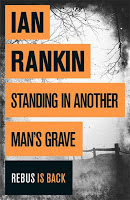 I recall my reaction on spotting the latest in Ian Rankin’s award-winning Inspector Rebus series; it was something along the lines of, *Gasp* “Squeeeee!”. At which point, I lunged at the bookshelf and immediately turned to check out the book from the library. After 25 years of publishing the series, Standing in Another Man’s Grave (M) is Rankin’s 18th Rebus novel and one I wasn’t sure I would ever see.
I recall my reaction on spotting the latest in Ian Rankin’s award-winning Inspector Rebus series; it was something along the lines of, *Gasp* “Squeeeee!”. At which point, I lunged at the bookshelf and immediately turned to check out the book from the library. After 25 years of publishing the series, Standing in Another Man’s Grave (M) is Rankin’s 18th Rebus novel and one I wasn’t sure I would ever see.  In 2007, Rankin retired his best-known literary character, Detective Inspector John Rebus, when Rebus reached the age of 60, the mandatory retirement age for Scottish police officers. (Apparently one Scottish MP joked that the limit ought to be raised to 65, so that Rebus might keep his job). Book 17, Exit Music, ended dramatically enough; with Rebus desperately trying to shake life into the body of his long-time nemesis, crime boss Morris Gerald “Big Ger” Cafferty, after he flatlined in hospital. After such a shocking scene, I admit that I couldn’t quite accept that Rebus was gone for good. I scoured the Novelist database for Rankin read-alikes, like Ken Bruen, until I had read all of their books, too. Yet, according to an interview Rankin gave to the Hindustan Times in 2010, “Rebus is merely retired not dead. He is working with the police department as a civilian. He lives in a compartment in my head, waiting patiently to be brought back to life.”
In 2007, Rankin retired his best-known literary character, Detective Inspector John Rebus, when Rebus reached the age of 60, the mandatory retirement age for Scottish police officers. (Apparently one Scottish MP joked that the limit ought to be raised to 65, so that Rebus might keep his job). Book 17, Exit Music, ended dramatically enough; with Rebus desperately trying to shake life into the body of his long-time nemesis, crime boss Morris Gerald “Big Ger” Cafferty, after he flatlined in hospital. After such a shocking scene, I admit that I couldn’t quite accept that Rebus was gone for good. I scoured the Novelist database for Rankin read-alikes, like Ken Bruen, until I had read all of their books, too. Yet, according to an interview Rankin gave to the Hindustan Times in 2010, “Rebus is merely retired not dead. He is working with the police department as a civilian. He lives in a compartment in my head, waiting patiently to be brought back to life.”  Civilian life suits Rebus. Although still as reckless as ever, Rebus’ status as a civilian staffer with Edinburgh’s cold case unit allows him a little more freedom. Rankin adds a psychologically interesting element to the novel when Rebus’ path crosses that of another Rankin character, DI Malcolm Fox from the Complaints and Conduct Department of Lothian and Borders Police (The Complaints, 2009). As the plot develops, so do Rankin’s characters (including Scotland itself). In a book review published on the New Zealand music website, The Coast, the writer comments that,
Civilian life suits Rebus. Although still as reckless as ever, Rebus’ status as a civilian staffer with Edinburgh’s cold case unit allows him a little more freedom. Rankin adds a psychologically interesting element to the novel when Rebus’ path crosses that of another Rankin character, DI Malcolm Fox from the Complaints and Conduct Department of Lothian and Borders Police (The Complaints, 2009). As the plot develops, so do Rankin’s characters (including Scotland itself). In a book review published on the New Zealand music website, The Coast, the writer comments that,The inspector seems to gain as much pleasure from sticking it to the man as he does the work of policing, and as the plot thickens and twists Rebus becomes more relaxed, inclined to wax philosophical, the only hint of tension visible in his ubiquitous drinking. As Rebus reflects on the literal and emotional mileage of the investigation, it occurs to him that while “he had always thought of roads as simple, mute entities . . . he knew differently now – they had individual identities and foibles.” Even as he approaches his twilight years, his restlessness is unabated.
Reading Standing in Another Man’s Grave, I felt as restless as Rebus. I found myself looking for opportunities to read snatches of text whenever I had a spare moment. It’s a quick read and hard to put down; I’m already looking ahead to number 19 ….



